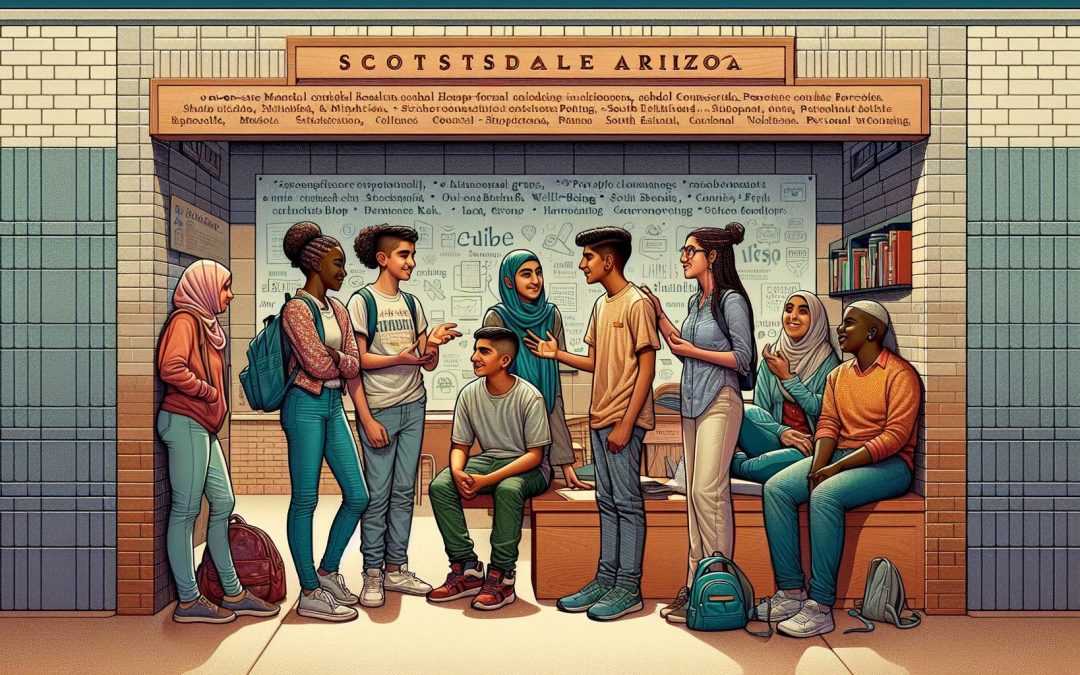Navigating the ups and downs of school life can be a rollercoaster for many students. It’s not just about acing tests or making the team anymore; it’s also about maintaining mental well-being. That’s why I’m thrilled to dive into the topic of schools in Scottsdale, Arizona, that are stepping up their game by offering on-site mental health resources for their students.
Scottsdale is known for its picturesque landscapes and vibrant community, but it’s the proactive approach of its schools towards student mental health that’s truly commendable. From counseling services to wellness programs, these institutions are ensuring that their students don’t have to face their struggles alone. Let’s explore how these schools are making a difference in the lives of their students by providing them with the support they need, right where they need it.
Importance of Mental Health Support in Schools
Growing up, I’ve always believed that a sound mind is just as crucial as a healthy body, especially for students. It’s during our school years that we face some of life’s most challenging hurdles, not just academically but emotionally and socially too. That’s why I’ve come to see the immense value in having mental health support readily available in schools.
In Scottsdale, Arizona, schools have started to acknowledge this need by integrating on-site mental health resources. This initiative isn’t just about addressing issues after they’ve escalated; it’s about prevention, early intervention, and fostering a supportive environment for all students.
Here are a few reasons why mental health support in schools is essential:
- Early Detection: With professionals readily available, signs of mental health issues can be identified early. This can be a game-changer for many students, helping them get the support they need before their challenges become overwhelming.
- Reducing Stigma: By normalizing mental health support, schools can play a significant role in reducing the stigma around seeking help. This encourages a more open and supportive school culture.
- Academic Success: Mental well-being is closely linked to academic performance. Students who receive the support they need are more likely to excel academically.
- Lifelong Skills: Beyond just the immediate benefits, learning to manage one’s mental health is a lifelong skill. Schools offering these resources help equip students with strategies they can use well beyond their academic years.
Seeing how Scottsdale schools are prioritizing mental health gives me hope. It’s about recognizing that mental well-being is pivotal for holistic development. Whether it’s through counseling, wellness programs, or simply fostering open conversations, the impact of these initiatives is profound. The focus on mental health in educational settings may still be evolving, but the steps taken by these schools are surely paving the way for a more inclusive and supportive environment for students to thrive in.
Overview of Scottsdale, Arizona

In my journey of exploring the significance of mental health resources in schools, I’ve turned my focus towards Scottsdale, Arizona. This city, nestled in the heart of the Sonoran Desert, isn’t just known for its picturesque landscapes and luxurious resorts; it’s become a beacon for progressive educational practices, particularly in the domain of student well-being.
Living here has given me an interesting perspective on how community values and priorities can shape education. Scottsdale prides itself on its high-quality school districts, both public and private, that strive to offer comprehensive educational experiences. What strikes me most, though, is how these schools are not just academic havens but are deeply invested in the holistic development of their students.
I’ve personally witnessed an increasing emphasis on creating supportive environments that foster mental well-being. This shift isn’t just a trend but a reflection of the community’s recognition of the importance of mental health in ensuring student success. Schools in Scottsdale are integrating on-site mental health resources deliberately, aiming to address and prevent issues before they escalate. This approach has positioned Scottsdale as a leader in mental health advocacy within educational settings.
The city’s dedication to this cause is evident in the myriad of programs and initiatives designed to break down the stigma associated with seeking help. From counseling and workshops to peer support groups, the resources available in Scottsdale schools are extensive and accessible. It’s been heartening to see these efforts not only receive recognition but also encourage other districts to reconsider their approach to student well-being.
As I delve deeper into this subject, I’m constantly reminded of the power of community and the difference proactive measures can make in young lives. Scottsdale’s commitment to mental health support in schools is a testament to the positive impact such strategies can have on the educational experience and beyond.
Schools Leading the Way in Mental Health Resources
In Scottsdale, a handful of schools have truly set the bar high when it comes to providing on-site mental health resources. These educational institutions have recognized the profound impact that mental well-being has on student success, both academically and personally. Let me share with you some standout examples that have caught my eye.
First, there’s Chaparral High School. They’ve launched a comprehensive mental health program that’s nothing short of impressive. The program includes trained counselors, peer support groups, and workshops designed to teach students about coping mechanisms and resilience. What sets Chaparral apart is its commitment to creating an environment where students feel safe and supported to discuss their mental health openly.
Next on the list is Desert Mountain High School. This school has taken a proactive approach by integrating mental health education into the core curriculum. Students learn about mental health in the same way they learn about history or mathematics, which is revolutionary, to say the least. Desert Mountain also partners with local mental health professionals to provide workshops and one-on-one counseling sessions.
Not to be overlooked, Saguaro High School offers a unique peer mentoring program. Senior students are trained to offer support and guidance to their younger peers, creating a culture of empathy and understanding. This peer-to-peer approach has shown to be incredibly effective in breaking down barriers and reducing the stigma around seeking help.
Each of these schools has understood that addressing mental health is not just about providing resources but also about changing the culture within the school. They’ve demonstrated how prioritizing mental wellbeing can lead to a more supportive, inclusive, and thriving educational environment. It’s clear that their efforts are paving the way for other schools to follow, demonstrating the power of community and commitment in promoting mental health awareness.
On-site Counseling Services and Programs
As I delve deeper into the topic, it’s remarkable to see how schools in Scottsdale have taken significant strides in providing on-site counseling services and programs. One of the core aspects that stood out to me was the breadth and depth of these offerings.
At Chaparral High School, the on-site counseling services aren’t just about crisis management. Instead, they’ve built a robust framework aimed at fostering a healthy mental environment for all students. From individual counseling sessions to group workshops focusing on stress management, the efforts here are comprehensive. Coping mechanisms and emotional resilience are key themes, ensuring students are not just heard but also taught how to navigate life’s challenges.
Desert Mountain High School takes a slightly different approach by weaving mental health education into the existing curriculum. This initiative ensures that every student receives foundational knowledge about mental well-being. Furthermore, their collaboration with local mental health professionals brings real-world insights into the classroom, something I found particularly innovative.
Saguaro High School’s peer mentoring program deserves a special mention. It’s one thing to have adults talking about mental health, but having peers provide support adds an invaluable layer of empathy and understanding. This program not only aids students in need but also empowers others to be part of the solution, creating a supportive community fabric that benefits everyone.
The proactive stance of these schools in Scottsdale on mental health is commendable. By providing on-site counseling services and inclusive programs, they’re not just addressing issues as they arise but are actively working to create a culture of understanding, support, and well-being.
Impact of On-site Mental Health Resources on Students

In diving into the world of on-site mental health resources at schools, I’ve discovered a profound impact on students’ lives in Scottsdale, Arizona. My exploration led me to see the tangible benefits these services provide, extending far beyond the school grounds.
One of the first things I noticed was the improvement in student attendance. It’s no secret that mental health issues can significantly affect a student’s desire and ability to attend school. However, with these resources readily available, students feel more supported and less overwhelmed, encouraging consistent attendance. Schools like Chaparral and Desert Mountain have reported a noticeable uptick in daily attendance rates since integrating these mental health services.
Academic performance has also seen a boost. Students with access to mental health support tend to exhibit higher levels of concentration and improved academic outputs. The stress reduction from counseling and mental health programs allows students to focus better during class and while doing homework. This was particularly evident in Saguaro High School, where the peer mentoring program led to a supportive learning environment, fostering an inclusive and productive academic community.
Perhaps most importantly, I’ve observed an incredible leap in overall student well-being. The presence of on-site mental health resources equips students with coping mechanisms for stress, anxiety, and other emotional challenges. This proactive approach in schools in Scottsdale is creating a generation of students who are not only academically equipped but also emotionally resilient.
| Key Impact | Observation |
|---|---|
| Attendance | Noticeable increase in daily attendance rates |
| Academic Performance | Higher concentration levels and improved outputs |
| Overall Well-being | Enhanced coping mechanisms and emotional resilience |
By integrating mental health education into their curriculum and fostering a supportive environment through programs like peer mentoring, schools in Scottsdale are setting a precedent for the importance of mental health in educational settings.
Conclusion
The strides made by schools in Scottsdale have shown us the undeniable value of integrating mental health resources directly on campus. Seeing the positive shifts in student behavior and academic performance has been nothing short of inspiring. It’s clear that when we take steps to address mental health proactively, the benefits ripple out far beyond the classroom. I’m hopeful that the success stories from Chaparral, Desert Mountain, and Saguaro will inspire more schools to follow suit. Here’s to building a future where every student has the support they need to thrive both academically and emotionally.







